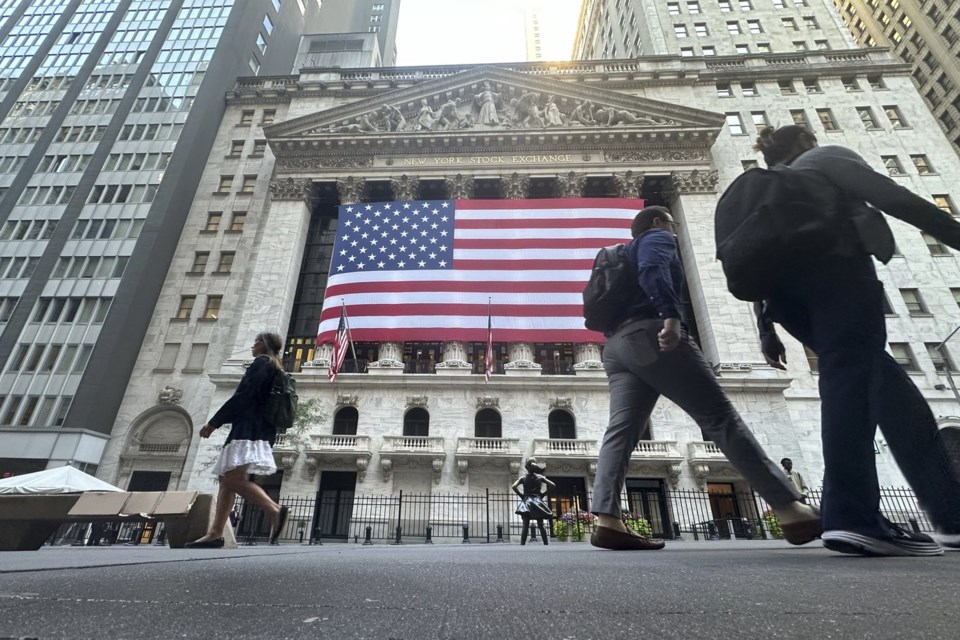NEW YORK (AP) — The Dow Jones Industrial Average closed at another all-time high after recouping its losses from early September. The S&P 500 rose close to its own record, but was held back by losses in Big Tech companies like Apple and Nvidia. The Dow added 0.6% Monday, the S&P 500 rose 0.1%, and the Nasdaq composite fell 0.5%. The mixed results came ahead of the most anticipated meeting of the Federal Reserve in years. More traders are betting that the Fed will cut its main interest rate Wednesday by a larger-than-usual amount in a bid to shore up the economy.
THIS IS A BREAKING NEWS UPDATE. AP’s earlier story follows below.
NEW YORK (AP) — U.S. stock indexes are drifting near their records Monday as Wall Street gears up for the most anticipated meeting of the Federal Reserve in years.
The S&P 500 was edging up by 0.1% in late trading and pulling within 0.6% of its all-time high set in July. The Dow Jones Industrial Average was up 243 points, or 0.6%, and on track to set its own record. The Nasdaq composite was down 0.6% with an hour remaining in trading.
Most stocks were rising on Wall Street, and Oracle's gain of 4.7% helped lead the market. The software company continued a strong run that began last week with a better-than-expected profit report.
Alcoa also jumped 6.5% after saying it would sell its ownership stake in a Saudi Arabian joint venture to Saudi Arabian Mining Co. for $950 million in stock and $150 million in cash. But drops for some influential Big Tech stocks kept indexes in check, including declines of 2.8% for Apple and 2.3% for Nvidia. They're among the market's most influential stocks because they're among the largest by market value.
Stock indexes have been taking a jagged, scary ride toward their records. After briefly dropping nearly 10% below its all-time high last month on worries about the U.S. economy and other hiccups in global markets, the S&P 500 is just one middling day away from its all-time high on excitement about coming cuts to interest rates.
Treasury yields eased in the bond market ahead of what’s expected to be the week’s main event. On Wednesday, the widespread expectation is for the Federal Reserve to cut its main interest rate for the first time in more than four years to deliver some relief to the economy.
The only question is by how much the Fed will cut. Traders are shifting more bets toward a larger-than-usual move of half a percentage point, according to data from CME Group. They’re anticipating a 61% chance the Fed will go beyond the more traditional cut of a quarter of a percentage point. That’s up from 50% on Friday and just 30% a week ago.
The difference between a half-point cut and a quarter may sound academic, but it can have far-ranging effects. While lowering rates relieves pressure on the economy, it can also give inflation more fuel.
The Federal Reserve has been keeping its main interest rate at a two-decade high in hopes of slowing the economy enough to stifle high inflation. With inflation having eased substantially from its peak two summers ago, the Fed has said it can turn more focus to bolstering the slowing job market and economy. Some critics say it may be moving too late, increasing the risk of a possible recession.
A Fed cut of half a percentage point would likely be the best case for the stock market in the very short term, according to Michael Wilson and other strategists at Morgan Stanley. But that's only if the Fed can convince investors it's not getting forced into a bigger-than-usual cut because of worries about a recession, among other factors.
The more important thing for where stocks are heading over the next three to six months will be how well the job market holds up, according to Wilson. If employment weakens, stocks could fall regardless of whether the Fed cuts by half or a quarter of a percentage point on Wednesday.
In the bond market, the yield on the 10-year Treasury fell to 3.62% from 3.66% late Friday. The two-year yield, which moves more closely with expectations for the Fed, eased to 3.56% from 3.59%.
That was despite a report in the morning showing manufacturing in New York state returned to growth in September. That surprised economists, who were expecting another month of contraction for an area of the economy that’s been hit hard by high interest rates.
On Wall Street, Carl Icahn's Icahn Enterprises rose 12.1% after it said a U.S. judge dismissed a proposed class-action lawsuit against the company, one based on allegations by a research firm that looks for financial irregularities and tries to profit when the stock prices fall.
Fertilizer producer Mosaic fell 3.1% after it said electrical equipment failures at mines and Hurricane Francine will reduce its production of potash and phosphate in the current quarter.
In stock markets abroad, indexes were mixed amid mostly modest movements across Europe and Asia. Hong Kong’s Hang Seng added 0.3% after data released over the weekend showed China’s economy slowed further in August.
Markets in Japan, mainland China and South Korea were closed for holidays.
___
AP Writers Matt Ott and Zimo Zhong contributed.
Stan Choe, The Associated Press


